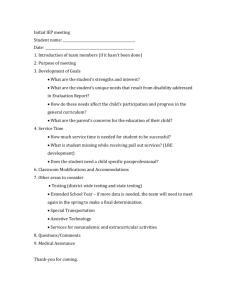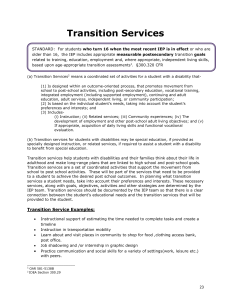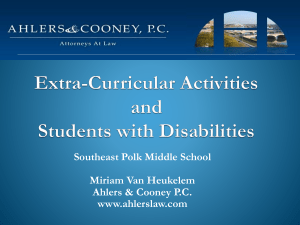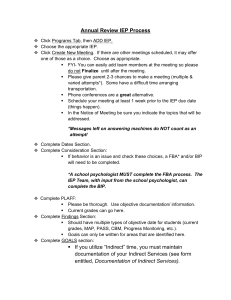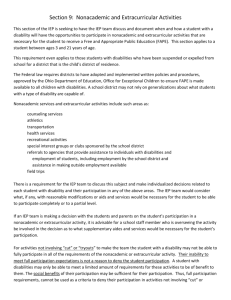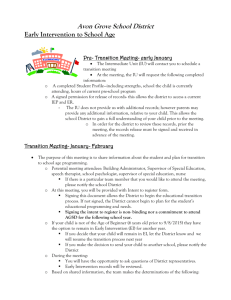Extracurricular and Nonacademic Supports for Students with
advertisement
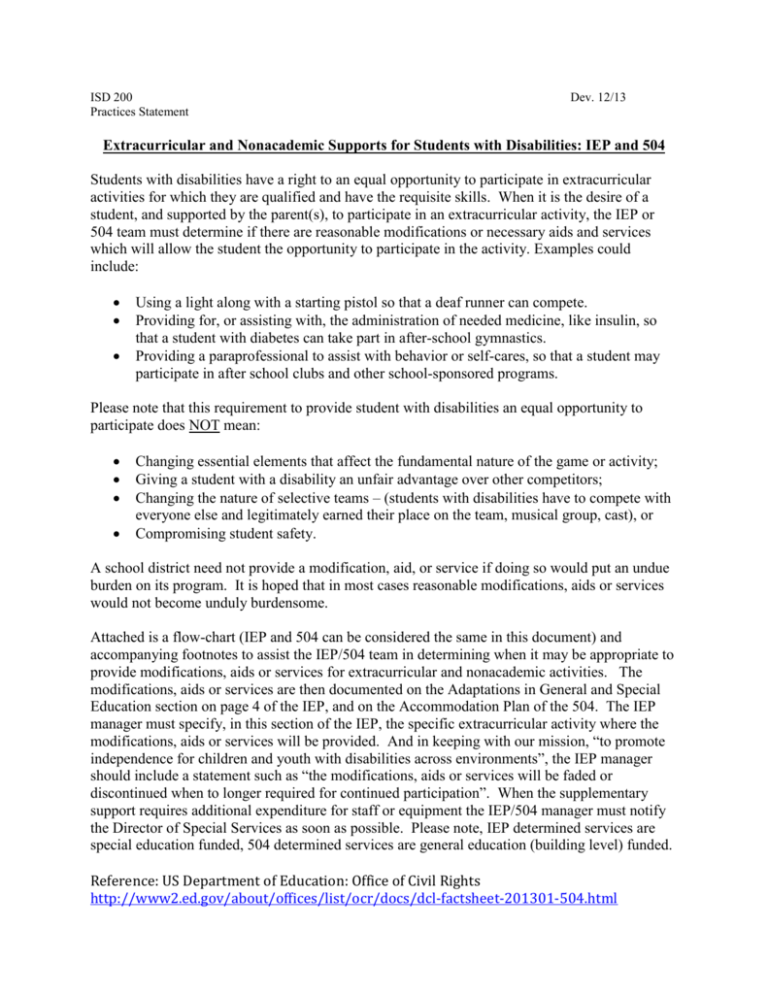
ISD 200 Practices Statement Dev. 12/13 Extracurricular and Nonacademic Supports for Students with Disabilities: IEP and 504 Students with disabilities have a right to an equal opportunity to participate in extracurricular activities for which they are qualified and have the requisite skills. When it is the desire of a student, and supported by the parent(s), to participate in an extracurricular activity, the IEP or 504 team must determine if there are reasonable modifications or necessary aids and services which will allow the student the opportunity to participate in the activity. Examples could include: Using a light along with a starting pistol so that a deaf runner can compete. Providing for, or assisting with, the administration of needed medicine, like insulin, so that a student with diabetes can take part in after-school gymnastics. Providing a paraprofessional to assist with behavior or self-cares, so that a student may participate in after school clubs and other school-sponsored programs. Please note that this requirement to provide student with disabilities an equal opportunity to participate does NOT mean: Changing essential elements that affect the fundamental nature of the game or activity; Giving a student with a disability an unfair advantage over other competitors; Changing the nature of selective teams – (students with disabilities have to compete with everyone else and legitimately earned their place on the team, musical group, cast), or Compromising student safety. A school district need not provide a modification, aid, or service if doing so would put an undue burden on its program. It is hoped that in most cases reasonable modifications, aids or services would not become unduly burdensome. Attached is a flow-chart (IEP and 504 can be considered the same in this document) and accompanying footnotes to assist the IEP/504 team in determining when it may be appropriate to provide modifications, aids or services for extracurricular and nonacademic activities. The modifications, aids or services are then documented on the Adaptations in General and Special Education section on page 4 of the IEP, and on the Accommodation Plan of the 504. The IEP manager must specify, in this section of the IEP, the specific extracurricular activity where the modifications, aids or services will be provided. And in keeping with our mission, “to promote independence for children and youth with disabilities across environments”, the IEP manager should include a statement such as “the modifications, aids or services will be faded or discontinued when to longer required for continued participation”. When the supplementary support requires additional expenditure for staff or equipment the IEP/504 manager must notify the Director of Special Services as soon as possible. Please note, IEP determined services are special education funded, 504 determined services are general education (building level) funded. Reference: US Department of Education: Office of Civil Rights http://www2.ed.gov/about/offices/list/ocr/docs/dcl-factsheet-201301-504.html Minnesota Administrators for Special Education (MASE) 1884 Como Ave. St. Paul, MN 55108 651-645-6272 phone 651-645-7518 fax www.mnase.org members@mnasa.org Decision Flowchart: Extracurricular and Nonacademic Supports Is the student “otherwise qualified” to participate in the nonacademic or extracurricular service or activity? 1 The student is not eligible to participate in the service or activity. No Yes No Does the student have the requisite skill(s) necessary to access and participate in the service or activity? 2 Can the student acquire the requisite skill(s) if provided instruction? 3 No Yes Yes Yes Are the skill(s) taught in general education or some other non-special education environment? No Is acquiring the skill(s) an identified need on the most recent evaluation? 4 No As the student can access and participate in the activity without supports, the IEP does not need to address the issue. No Does the student need supplementary supports in order to access and participate in the service or activity? 5 Yes This is a FAPE issue that should be addressed as an instructional goal or objective within the IEP. Yes Supports needed to access and participate in the nonacademic or extracurricular activity must be included in the student’s IEP GEL 3.18.11 Yes Are the needed supports allowable and reasonable for the service or activity? 6 No The service or activity is not appropriate for the student. 1. “Otherwise qualified” refers to the eligibility requirements for participation in the activity. For example: MN State High School League rules require that a student pass a physical exam and refrain from the use of alcohol and drugs. If the student cannot pass the physical or uses drugs or alcohol, s/he is not eligible to participate in an activity governed by the League. a. If eligible, a student must be provided an opportunity to try out for a competitive team/activity, but cannot be guaranteed a position on that team. b. If an activity (e.g. intermural sports, school clubs and volunteer jobs such as an athletic team manager) has no eligibility criteria or description of essential duties or skills, it must be assumed the student is otherwise qualified. 2. “Requisite skills” refers to the mental, physical, behavioral and social skills necessary to access and participate in an activity. For example, a student must be able to learn the rules, moves and strategies of playing chess in order to be on the chess team or be able to run independently to be on the cross-country team. 3. ‘Acquiring the requisite skills’ refers to the student’s ability to learn and utilize the skills necessary to safely access and participate in the service or activity when provided instruction. 4. ‘Identified need on the most recent evaluation’ addresses the issue of whether acquiring the skill is related to FAPE. If the need was identified in the evaluation, then it is a FAPE issue and learning the skill should be addressed in the IEP as a goal or objective. If not, it would be inappropriate to teach that skill within special education. For example, if there were an identified transition need for the student to obtain a drivers license so that s/he could transport her/himself to and from work, it would be appropriate to address that issue in the IEP as an instructional goal or objective. However, if the parent or student ‘want’ to do something that is optional and is not directly tied to an identified special education need, it would not be appropriate to teach that skill in special education. 5. Supplementary supports are “aids, services and other supports that are provided in regular education classes, other education-related settings and in extracurricular and nonacademic settings to enable students with disabilities to be educated with nondisabled children to the maximum extent appropriate.” (34 CFR § 300.42). Supplementary supports include: adaptations, modifications, adaptive equipment, related services and training for staff who work with the student. 6. “Allowable” and “reasonable” refers to what is permitted under the rules or norms of an activity. For example, an electronic communication device (such as a Dynavox) would not be allowed on the court during a League basketball game; and it would not be reasonable to use such a device while playing flag football in physical education.
